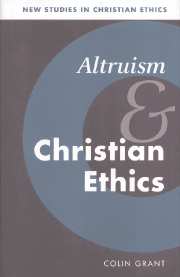1 - Explanations for altruism
Published online by Cambridge University Press: 22 September 2009
Summary
There is no shortage of evidence to suggest that we are fundamentally, and all but irreparably, characterized by selfishness. If reports of consumptive greed and callous disregard for the obvious distress of others do not clinch the point, the representations of science, particularly the portrayals of socio-biology, confirm that impression beyond any reasonable doubt. This emerging discipline shows how altruism is fundamentally unnatural, an aberration that runs directly counter to the natural flow of life.
THE IMPOSSIBILITY OF NATURAL ALTRUISM
Sociobiologists contend that the altruism that concerns them is not the everyday variety of one agent assisting another agent, perhaps at significant cost to the assisting agent. At its most basic, the biological point of life is more life, reproduction. Consequently, from this perspective, altruism refers to one organism enhancing the reproductive advantage of another, especially at cost to itself. Yet this biological restriction has a way of encompassing broader, more conventional senses of the term that far exceed issues of reproductive advantage and disadvantage.
From a biological point of view, altruism should not exist. The Darwinian theory of natural selection holds that those organisms survive and reproduce which are best adapted to their environment. They are “selected” by the natural processes of geography, climate, food supplies, predation, etc. Any organism that devotes itself to the welfare of other organisms, to that extent jeopardizes its own prospects for reproduction and enhances those of the recipient of the assistance.
- Type
- Chapter
- Information
- Altruism and Christian Ethics , pp. 3 - 33Publisher: Cambridge University PressPrint publication year: 2000

